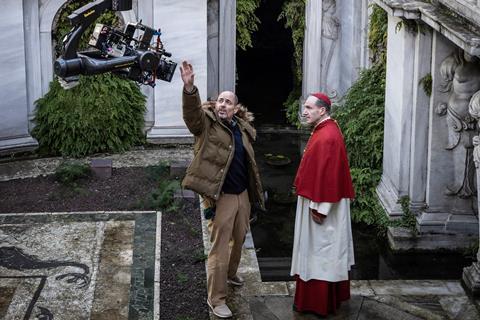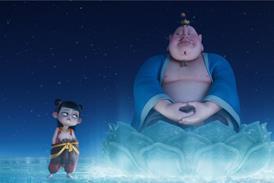Edward Berger follows an Oscar-winning First Word War drama with a papal thriller. He tells Screen how he was bewitched by the intrigue and power play of Conclave.

After All Quiet On The Western Front won seven Baftas and four Oscars in spring 2023, German director Edward Berger became the most in-demand filmmaker in Hollywood, offered everything from the new Bourne to the next Bond — at least according to the internet, with even a prominent US trade outlet reporting that he was being courted by George Clooney and Brad Pitt to make Ocean’s 14. Alas, none of it was true.
“Not even a conversation,” Berger tells Screen International. “It’s just rumours. The problem with internet journalism is they have to create news and it has to be fast, so there’s no time to get proof. I mean, I love the Bourne movies. I absolutely love Bond. But I’m just thinking about my own films, and they’re usually personal, smaller movies I’ve been developing for years, with writer and producer friends.”
One such project was Conclave, from Focus Features in association with FilmNation Entertainment, Indian Paintbrush and House Productions, which premiered at Telluride before embarking on an exhaustive festival run that took in Toronto and London. Berger began developing this adaptation of Robert Harris’s 2016 bestseller with producer Tessa Ross and screenwriter Peter Straughan around six years ago, predating even All Quiet.
A gripping locked-room mystery, brimming with political intrigue, petty jealousy and ecclesiastical backstabbing, Conclave — which at press time had grossed $30.2m in North America, and had just debuted in the UK and Ireland via Black Bear with a healthy $1.4m (£1.1m) weekend — stars Ralph Fiennes, Stanley Tucci, John Lithgow and Isabella Rossellini, and centres on Fiennes’ conflicted Cardinal Lawrence, tasked with running a papal election. As the Catholic Church’s leaders gather in the Sistine Chapel to vote on a new pope, Lawrence uncovers a series of secrets that could rock the church to its core.
“The movie felt like a political chess game,” says Berger. “And when there’s a throne that’s vacant, there are different parties vying for that power. That drew me to it.”
Well, that and the involvement of Straughan (The Snowman, Tinker Tailor Soldier Spy). “Tessa Ross called me and said, ‘I might have a good script for you. I would love you to read it,’” recalls Berger. “I said that depends on who wrote it, and she said, ‘Peter Straughan.’ I said, ‘I want to read it right away.’ Whenever I’d read one of his scripts, it was not only a great story that felt like a thriller, it had soul, a second layer of meaning, something deeper than just story. What the movie is really about.”
In the case of Conclave, it is about Lawrence’s crisis of faith — and self-doubt is something the Oscar-winning Berger can relate to. “I’m driven by doubt,” he admits. “I question everything I do. Whether I should be doing this movie or that, whether I should say this, where the camera goes, all these things. It might be split-second doubts, but they’re still there and you must overcome them. I used to think directing was just assertion and certainty and exuding confidence, until I realised doubts are good. Embrace them.”
Interior life
As originally scripted — and in keeping with Harris’s novel — the Lawrence character was Italian, but Berger struggled to find an Italian actor who could make the film work. Then he hit on the idea of casting Fiennes and making the role English.
“This character is content in the second row,” says Berger. “He doesn’t want to be seen. He doesn’t even want to be there. He doesn’t have the most lines. He’s just listening. Ralph is so wonderful in terms of expressing things with his eyes and inviting you into his interior life. It’s an English quality, what this character has. He’s not a loud, bombastic politician. He’s a quiet man in the background. Anthony Hopkins in The Remains Of The Day is the perfect example, and Ralph felt drawn to playing that.”
The production filmed in Rome, on location and at the legendary Cinecitta Studios, and Straughan was there for most of it. While some directors baulk at having the writer on set, Berger would not have it any other way.
“He was my main confidant,” he reflects. “You sit there with your doubts, and it’s good to be able to turn to your right or left and ask, ‘What do you think?’ Even if you don’t accept that opinion, you’re able to talk about it. Peter has lived with this dialogue, he’s English and I’m not, and there will be moments where he has a better insight or a different insight. And whenever Peter said something, and Ralph didn’t know it came from Peter, I was pretending it was mine!”
In contrast to All Quiet, which was all action and very little dialogue, Conclave is almost the opposite, but Berger makes even the act of writing on a piece of paper cinematic and tense. “It is a lot of shots and detail,” he explains. “Stéphane Fontaine the cinematographer and I spent six weeks shot listing, especially those quiet voting scenes. I was afraid they would be repetitive, because there are five in the film, always the same location, so I storyboarded all of those to make sure we would shoot them differently and make them feel different.”
The tension is also stoked by another ear-catching score from All Quiet’s Oscar-winning composer Volker Bertelmann. “Music plays an extremely important part in telling you how to watch this movie, to just go ahead and enjoy it,” says Berger. “I like [music] if it’s not obvious, if it stings you a bit and shakes you awake. Cinema is difficult to get people to, so you need to grab them by the collar and say, ‘Pay attention!’ I also like hard sound cuts that might be jarring, but somehow tell me to focus on the screen.”
This shake-them-awake philosophy is fast becoming Berger’s métier. “I like it when shots are razor sharp,” he says, “when they’re locked off, precise, when they cut off part of the image, when the sound is sharp, when I hear every breath, and when the music goes against the image. I think the best director for showing you how shots can hurt is Steve McQueen; his camera is like a razor. It feels analytical and harsh, and I try to learn from that.”
Earlier this year, Berger shot 17-minute short Submerged, the first scripted film in Apple Immersive Video for the Apple Vision Pro mixed-reality headset, set aboard a Second World War submarine. He then headed to Macau for The Ballad Of A Small Player, starring Colin Farrell and Tilda Swinton, set to be released by Netflix next autumn.
“Again, it’s a first-person [film], it’s one character, Lord Doyle, Colin Farrell’s role, his perspective,” he says. “I think I’m always drawn to the same story. It’s a tormented person who liberates himself from that torment, on a very subjective journey. It’s about the end of capitalism in a way. And that felt like a great challenge to try to capture in a movie.”
Ballad took seven years to come to fruition. “Everything I’m doing now is older than [winning] Oscars,” says Berger, who admits All Quiet’s success did raise his profile in Tinseltown — albeit for around nine months. “Hollywood is a fast-lived place that forgets very quickly. Maybe we have a slightly easier time to have access to financing or at least people will read the script. They still will need to like it. They still need to think, ‘This could make money.’ We might develop something I think is great, and no-one else does, and it won’t get financed, no matter how many Oscars you have.”

























No comments yet